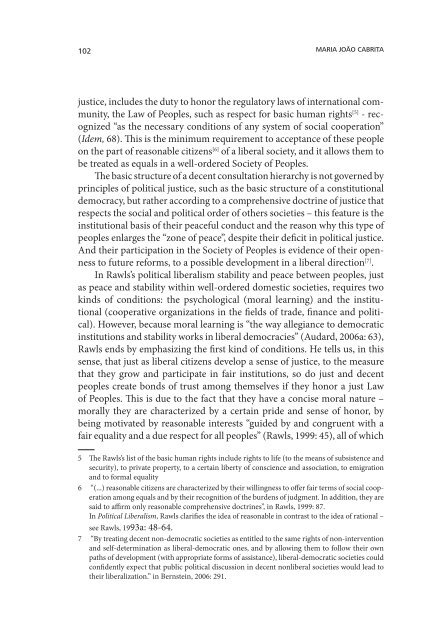Diacritica 25-2_Filosofia.indb - cehum - Universidade do Minho
Diacritica 25-2_Filosofia.indb - cehum - Universidade do Minho
Diacritica 25-2_Filosofia.indb - cehum - Universidade do Minho
Create successful ePaper yourself
Turn your PDF publications into a flip-book with our unique Google optimized e-Paper software.
102<br />
MARIA JOÃO CABRITA<br />
justice, includes the duty to honor the regulatory laws of international community,<br />
the Law of Peoples, such as respect for basic human rights [5] - recognized<br />
“as the necessary conditions of any system of social cooperation”<br />
(Idem, 68). Th is is the minimum requirement to acceptance of these people<br />
on the part of reasonable citizens [6] of a liberal society, and it allows them to<br />
be treated as equals in a well-ordered Society of Peoples.<br />
Th e basic structure of a decent consultation hierarchy is not governed by<br />
principles of political justice, such as the basic structure of a constitutional<br />
democracy, but rather according to a comprehensive <strong>do</strong>ctrine of justice that<br />
respects the social and political order of others societies – this feature is the<br />
institutional basis of their peaceful conduct and the reason why this type of<br />
peoples enlarges the “zone of peace”, despite their defi cit in political justice.<br />
And their participation in the Society of Peoples is evidence of their openness<br />
to future reforms, to a possible development in a liberal direction [7] .<br />
In Rawls’s political liberalism stability and peace between peoples, just<br />
as peace and stability within well-ordered <strong>do</strong>mestic societies, requires two<br />
kinds of conditions: the psychological (moral learning) and the institutional<br />
(cooperative organizations in the fi elds of trade, fi nance and political).<br />
However, because moral learning is “the way allegiance to democratic<br />
institutions and stability works in liberal democracies” (Audard, 2006a: 63),<br />
Rawls ends by emphasizing the fi rst kind of conditions. He tells us, in this<br />
sense, that just as liberal citizens develop a sense of justice, to the measure<br />
that they grow and participate in fair institutions, so <strong>do</strong> just and decent<br />
peoples create bonds of trust among themselves if they honor a just Law<br />
of Peoples. Th is is due to the fact that they have a concise moral nature –<br />
morally they are characterized by a certain pride and sense of honor, by<br />
being motivated by reasonable interests “guided by and congruent with a<br />
fair equality and a due respect for all peoples” (Rawls, 1999: 45), all of which<br />
5 Th e Rawls’s list of the basic human rights include rights to life (to the means of subsistence and<br />
security), to private property, to a certain liberty of conscience and association, to emigration<br />
and to formal equality<br />
6 “(...) reasonable citizens are characterized by their willingness to off er fair terms of social cooperation<br />
among equals and by their recognition of the burdens of judgment. In addition, they are<br />
said to affi rm only reasonable comprehensive <strong>do</strong>ctrines”, in Rawls, 1999: 87.<br />
In Political Liberalism, Rawls clarifi es the idea of reasonable in contrast to the idea of rational –<br />
see Rawls, 1993a: 48-64.<br />
7 “By treating decent non-democratic societies as entitled to the same rights of non-intervention<br />
and self-determination as liberal-democratic ones, and by allowing them to follow their own<br />
paths of development (with appropriate forms of assistance), liberal-democratic societies could<br />
confi dently expect that public political discussion in decent nonliberal societies would lead to<br />
their liberalization.” in Bernstein, 2006: 291.<br />
<strong>Diacritica</strong> <strong>25</strong>-2_<strong>Filosofia</strong>.<strong>indb</strong> 102 05-01-2012 09:38:23











![Programa [pdf] - cehum - Universidade do Minho](https://img.yumpu.com/17305425/1/190x135/programa-pdf-cehum-universidade-do-minho.jpg?quality=85)




